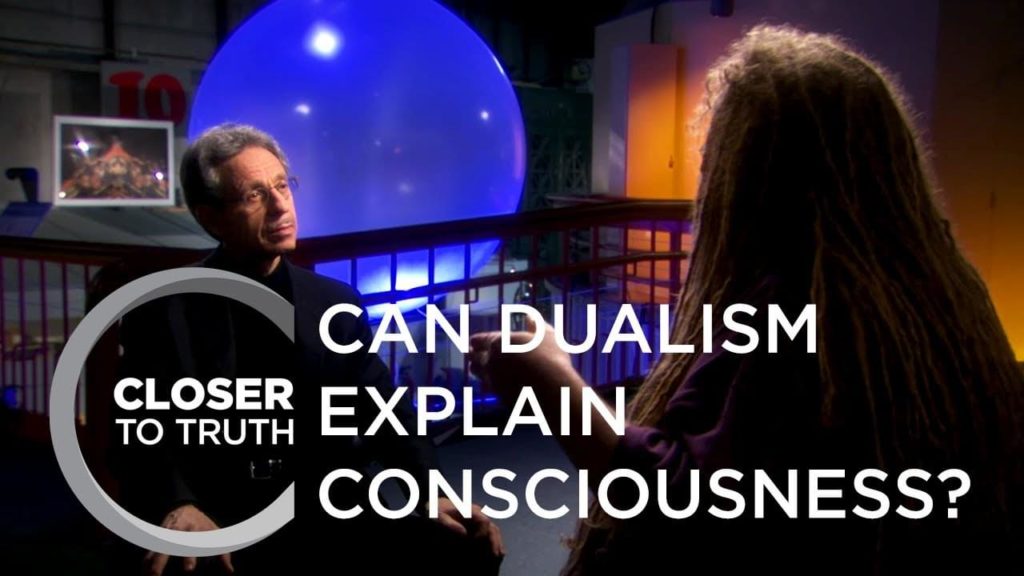
The video in the link below was posted on the youtube channel, “closer to truth”, yesterday is about dualism and whether it can enable us to explain [or make sense] of consciousness.
Furthermore the video in the link below is about the following motion:
Can dualism explain consciousness?
I believe the answer to the question is a categorical yes. Why?
Well, i cannot state why i believe this until i answer the following question first.
What fact about consciousness needs to be explained?
This is because, if we do not know that which needs to be explained, then we cannot dtermine whether dualism can enable us to explain it or not. However we’d like to know whether it is a valid explanation or not. And subsequently we need to know that which needs to be explained first.
I believe the following, namely that, for example, the following fact requires an explanation, that is to say, that no conscious state is physical. Therefore we can now determine whether dualism can enable us to explain why no conscious state is physical or not.
Please bear in mind that there are other facts about consciousnesses that require an explanation. Nevertheless i am only going to focus my attention on the question about the nature of consciousness.
The question is as follows:
Why are conscious states not physical?
Here’s why:
No conscious state is physical because there is a distinction between the physical body or the physical states of the brain and a conscious state.
That is why.
But is my explanation a valid explanation? Or can my explanation be justified?
I believe the answer to the aforementioned question is a categorical and resounding yes.
Furthermore i will demonstrate my justification now.
My justification, or rather, one of my justifications is as follows:
1.) Every physical things we have ever seen in this world had an objective, non personal, quantitative, and public nature.
Thus 2.) if consciousness is a physical thing, then consciousness has an objective, non personal, quantitative, and public nature, particularly because it is logically impossible for something to be what we perceived it as and yet not have none of the characteristics of what we perceived it as.
However 3.) no state consciousnesses has an objective, non personal, quantitative, and public nature. On the contrary every state of consciousness has a subjective, private, personal, and qualitative nature.
And subsequently 4.) no state of consciousness is a physical thing.
5.) If no state of consciousness is a physical thing, then any philosophical stance about the nature of consciousness that equates the consciousness with any physical thing contains the fallacy of equivocation, particularly because the fallacy of equivocation is committed whenever a concept is attributed to two distinct things.
Hence 6.) any philosophical stance about the nature of consciousness that equates the consciousness with any physical thing contains the fallacy of equivocation.
7.) The following philosophical stance, namely the philosophy of physicalism, equates every state of consciousness with the physical states of the brain.
So 8.) the concept physicalism contains the fallacy of equivocation.
11.) Every philosophical concept that contains the equivocation fallacy violates the law of identity, because every instance of an example of the equivocation fallacy implies the following, that is to say, that A is not A.
Hence 12.) the concept of physicalism violates the law of identity.
13.) If the concept of physicalism violates the law of identity, then the concept of physicalism violates the law of non contradiction, because every instance of an example of the equivocation fallacy implies the following, that is to say, that A is not A. [Let A represent consciousness.]
Hence 14.) the concept of physicalism violates the law of non contradiction.
15.) Every concept that violates the law of non contradiction is not only logically impossible, or logically nonsensical, but also logically incoherent.
So 16.) the concept of physicalism is not only logically impossible, or logically nonsensical, but also logically incoherent.
17.) For every concept, the concept is true if [and only if] it is coherent because truth is coherent on grounds of the coherence theory of truth,
Hence 18.) the concept of physicalism is necessarily not true.
19.) It is either that a concept is true or false.
Therefore 20.) the concept of physicalsim is false.
The totality of the argument should be perceived as the justification in favour of my explanation.
Finally, let us consider the following question:
Can dualsim enable us to make sense of why no conscious state is physical?
The answer is obviously yes.
Here’s why:
No conscious state is physical because a human being, or because human nature, is not essentially physical but a composite of two distinct things, namely, a physical thing [i.e the body] and a non physical thing [i.e the mind and consciousness], that can causally interact with each other in order to produce certain impression or physical effects. If human being, or if human nature is not essentially physical but a composite of two distinct things, namely, a physical thing [i.e the body] and a non physical thing [i.e the mind and consciousness], that can causally interact with each other in order, particularly to produce certain impression or physical effects, then dusalistic interractionisn is true. Hence dualistic interractionism is true.



Comments